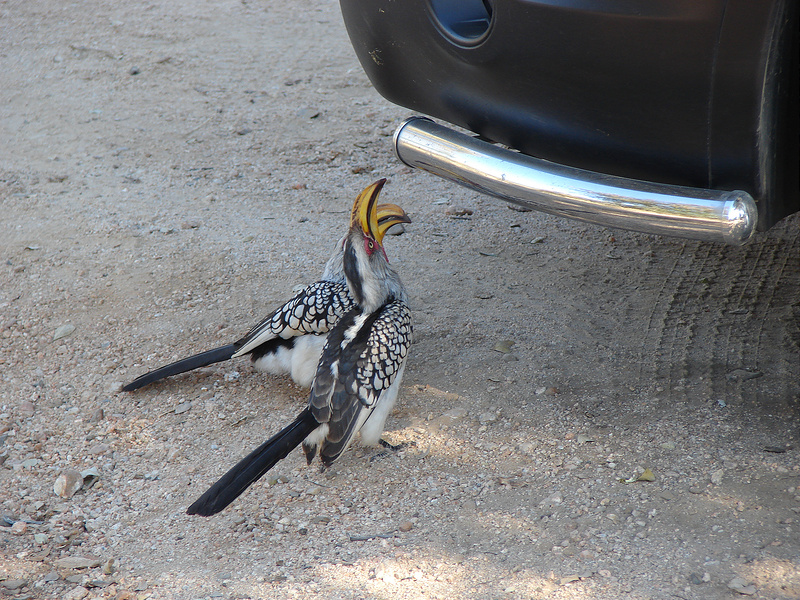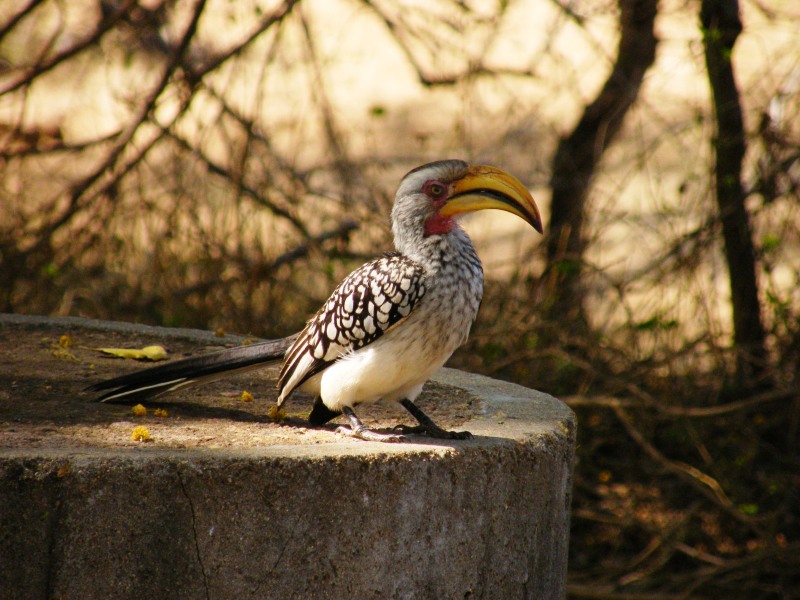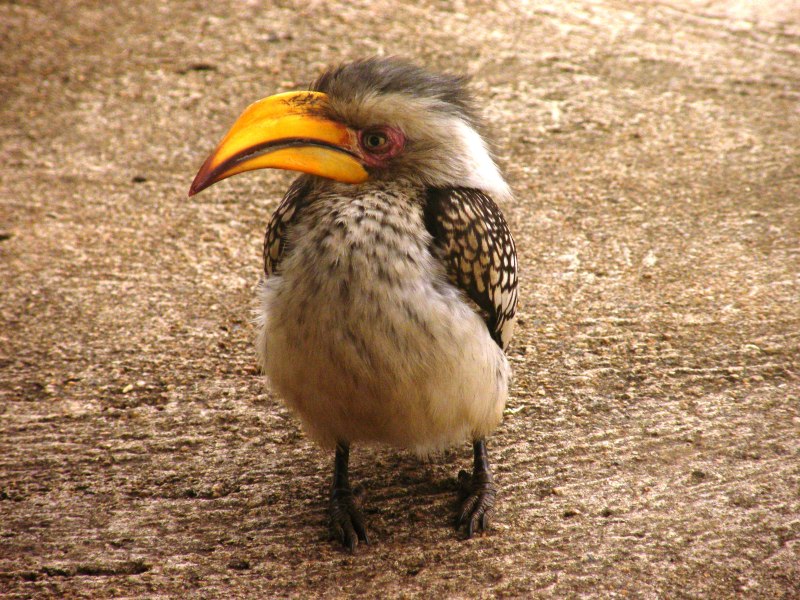HORNBILLS
Hornbills are not related to toucans. Toucans are only found in the Americas, while hornbills belong to Africa and the East. Ten species of hornbills are found in southern Africa and all but one lead mostly arboreal lives. The exeption is the huge, mainly terrestrial Southern Ground Hornbill
Insectivorous and frugivorous birds with large decurved bills, sometimes with a horny casque on the upper mandible. Arboreal or terrestrial feeders, or both, they nest in holes in trees (among rocks in a few species)and, in most species the female seals herself in during incubation. Their flight is heavy and undulating with periods of gliding. The bill of hornbills are light and largely hollow functioning as sound boxes that gives added resonance to their calls.
The most common hornbills will be found in the northern bushveld region and include the following birds:
Southern Yellow-billed Hornbill
African Grey Hornbill
Red-billed Hornbill
Southern Ground Hornbill
The less common Southern African hornbills are:
Crowned Hornbill
Monteiro's Hornbill
Bradfield's Hornbill
Trumpeter Hornbill
Damara Hornbill
Silvery-cheeked Hornbill
Hornbill - Bird of the Month: November 2012
Hornbill - Bird of the Month: November 2012
Last edited by PRWIN on Mon Nov 05, 2012 2:13 pm, edited 5 times in total.
http://prwinnan.wix.com/prwinnan-photography
Re: HORNBILL - African Wild Bird Of The Month November
Notes on nests:
1. When a female hornbill nests she uses mud and droppings to seal herself into a tree cavity with the help of her mate. She leaves only a small slit into which food can be passed. While incubating the eggs she depends on the male to feed her as she undergoes a complete moult of her flight feathers and is temporarily flightless
2. Ground hrnbills nests in very large tree holes like those created when branches fall from large trees. Felling of these old trees creates a shortage of suitable nest sites. Ground hornbills do not seal their nest cavities.
1. When a female hornbill nests she uses mud and droppings to seal herself into a tree cavity with the help of her mate. She leaves only a small slit into which food can be passed. While incubating the eggs she depends on the male to feed her as she undergoes a complete moult of her flight feathers and is temporarily flightless
2. Ground hrnbills nests in very large tree holes like those created when branches fall from large trees. Felling of these old trees creates a shortage of suitable nest sites. Ground hornbills do not seal their nest cavities.
http://prwinnan.wix.com/prwinnan-photography
Re: HORNBILL - African Wild Bird Of The Month November
1. Southern Yellow-Billed Hornbill (Tockus Leucomelas)
Common, near endemic resident. Large yellow bill (with reddish base in immature) separates this from all other hornbills. The call is 'wurk, wurk, wurk, wurk, wurk, wukwukak, wukwukak.......', the sound working up to a crescendo then fading away. Often two birds call simultaneously with a wing operning, head-bowing display. Conspicuous in dry bushveld and savanna woodland. Size 48-60cm (Geelbekneushoringvoel).
2. Red-billed Hornbill (Tockus erythrorhynchus)
Common resident .Identified by combination of red bill and black and white checkered upperparts which has plain brown upperparts. Immature has shorter bill and buff spots on upperparts. The call is similar to that of the Southern but is uttered more rapidly. Pairs and small flocks frequent dry bushveld broad - leaved woodland (particulary mopane) and thornveld, preferring drier conditions than the Southern. But often mixing with it. Forages mostly on open ground .
Size 42-50cm (Rooibekneushoringvoel).
3. Damara Hornbill (Tockus damarensis)
Fairly common, localised resident. Differs from the above species in having dark (not yellow) eyes. White forehead and ear coverts plus more extensive facial skin. Occurs in the Damaraland region of Namibia, especially the western escarpment. Size 42-50cm (Damararooibekneushoringvoel).
4. Crowned Hornbill (Tockus alboterminatus)
Fairly common resident. Told by having a casque on the red bill and entirely dark brown upperparts. Immature has a more orange bill and buff-tipped feathers on the upperparts. The call is a series of melancholy, piping whistles. Occurs in riverine, forest fringes, the canopy and fringes of lowland and coastal forests and well-wooded valleys. Feeds in the trees and roosts conspicuously on high, slender branches. Size 50-70cm (Gekroonde neushoringvoel).
Common, near endemic resident. Large yellow bill (with reddish base in immature) separates this from all other hornbills. The call is 'wurk, wurk, wurk, wurk, wurk, wukwukak, wukwukak.......', the sound working up to a crescendo then fading away. Often two birds call simultaneously with a wing operning, head-bowing display. Conspicuous in dry bushveld and savanna woodland. Size 48-60cm (Geelbekneushoringvoel).
2. Red-billed Hornbill (Tockus erythrorhynchus)
Common resident .Identified by combination of red bill and black and white checkered upperparts which has plain brown upperparts. Immature has shorter bill and buff spots on upperparts. The call is similar to that of the Southern but is uttered more rapidly. Pairs and small flocks frequent dry bushveld broad - leaved woodland (particulary mopane) and thornveld, preferring drier conditions than the Southern. But often mixing with it. Forages mostly on open ground .
Size 42-50cm (Rooibekneushoringvoel).
3. Damara Hornbill (Tockus damarensis)
Fairly common, localised resident. Differs from the above species in having dark (not yellow) eyes. White forehead and ear coverts plus more extensive facial skin. Occurs in the Damaraland region of Namibia, especially the western escarpment. Size 42-50cm (Damararooibekneushoringvoel).
4. Crowned Hornbill (Tockus alboterminatus)
Fairly common resident. Told by having a casque on the red bill and entirely dark brown upperparts. Immature has a more orange bill and buff-tipped feathers on the upperparts. The call is a series of melancholy, piping whistles. Occurs in riverine, forest fringes, the canopy and fringes of lowland and coastal forests and well-wooded valleys. Feeds in the trees and roosts conspicuously on high, slender branches. Size 50-70cm (Gekroonde neushoringvoel).
http://prwinnan.wix.com/prwinnan-photography
Re: HORNBILL - African Wild Bird Of The Month November
1. Southern Yellow-Billed Hornbill (Tockus Leucomelas)
Common, near endemic resident. Large yellow bill (with reddish base in immature) separates this from all other hornbills. The call is 'wurk, wurk, wurk, wurk, wurk, wukwukak, wukwukak.......', the sound working up to a crescendo then fading away. Often two birds call simultaneously with a wing operning, head-bowing display. Conspicuous in dry bushveld and savanna woodland. Size 48-60cm (Geelbekneushoringvoel).
Common, near endemic resident. Large yellow bill (with reddish base in immature) separates this from all other hornbills. The call is 'wurk, wurk, wurk, wurk, wurk, wukwukak, wukwukak.......', the sound working up to a crescendo then fading away. Often two birds call simultaneously with a wing operning, head-bowing display. Conspicuous in dry bushveld and savanna woodland. Size 48-60cm (Geelbekneushoringvoel).
http://prwinnan.wix.com/prwinnan-photography
Re: HORNBILL - African Wild Bird Of The Month November
Yellow-billed Hornbill with Brown-crowned Tchagra road-kill.
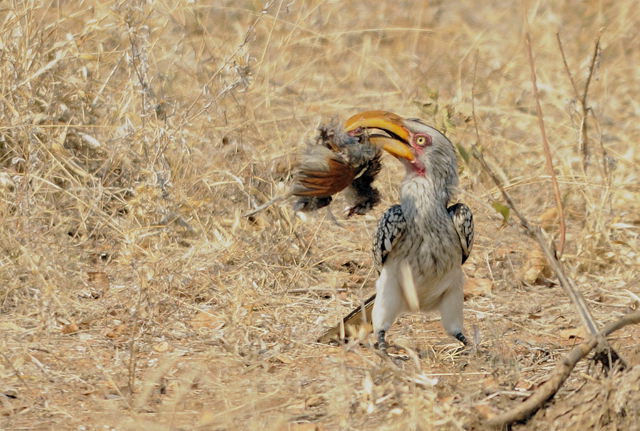
Preening.
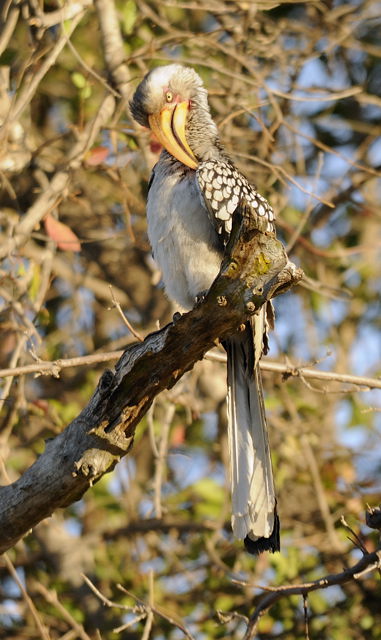
The Stare.
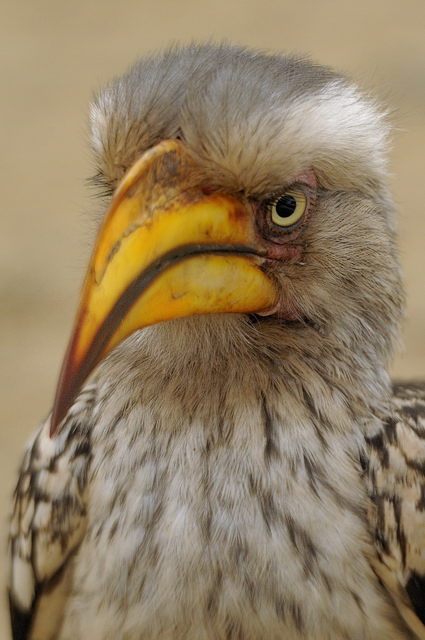
Posing on ground.
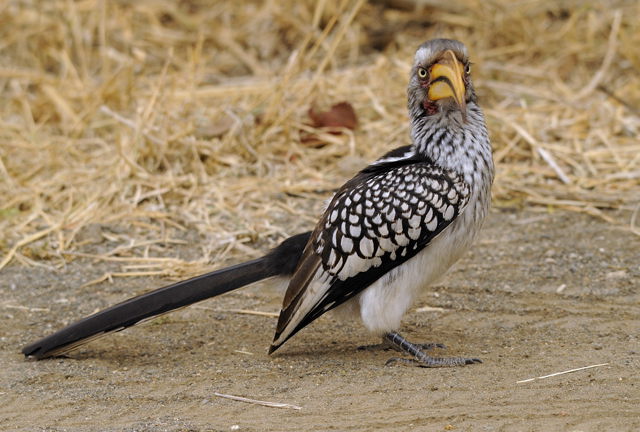

Preening.

The Stare.

Posing on ground.

Dewi
What is the good of having a nice house without a decent planet to put it on? (H D Thoreau)
What is the good of having a nice house without a decent planet to put it on? (H D Thoreau)
Southern Yellow-billed Hornbill
This one was feeding on termites close to Sirheni.
Targeting it's victim.
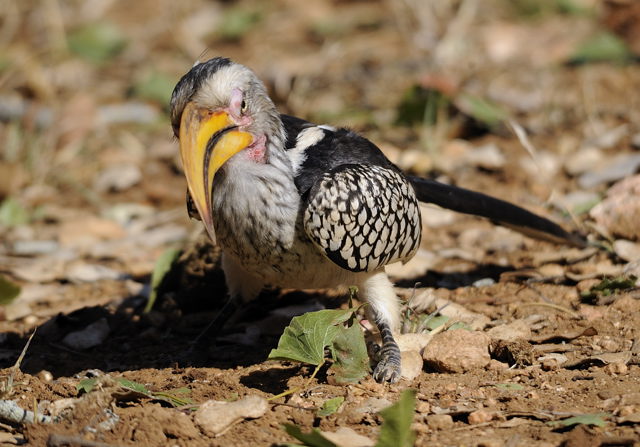
Picks it up in it's bill - you can just make it out at the tip.
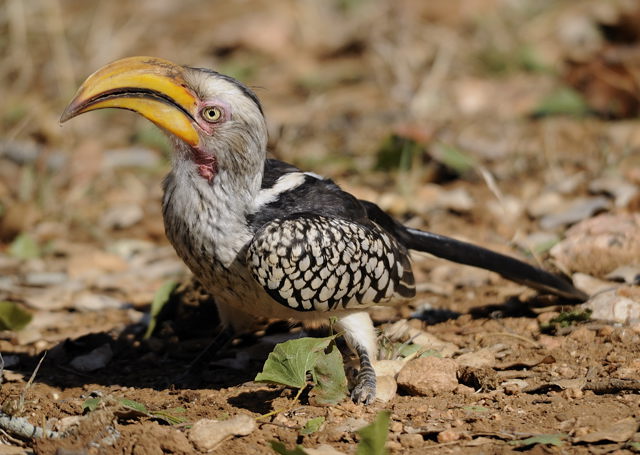
Flips it up into the air - again just visible.
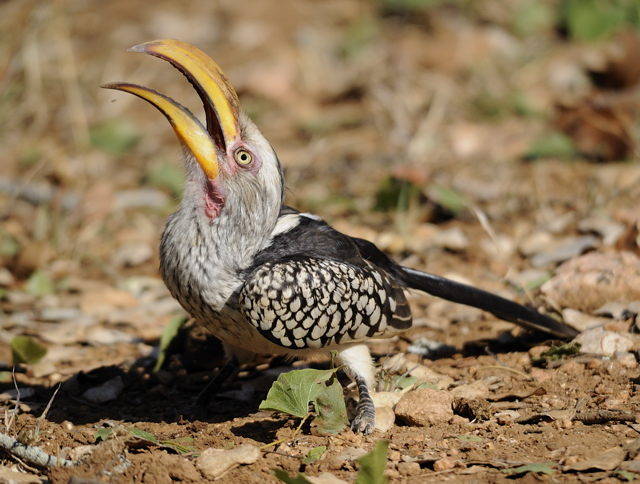
And gulps it down with smug satisfaction. -O
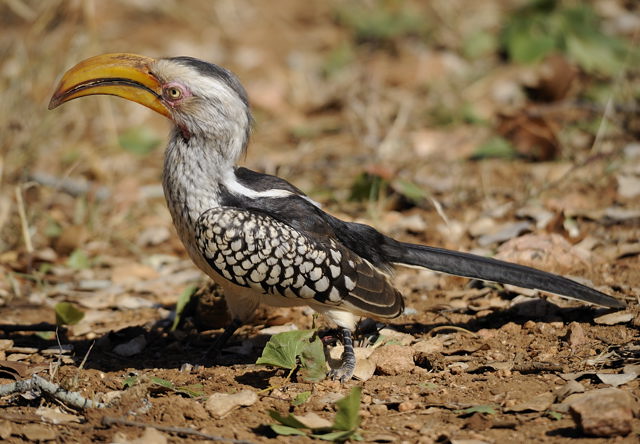
Targeting it's victim.

Picks it up in it's bill - you can just make it out at the tip.

Flips it up into the air - again just visible.

And gulps it down with smug satisfaction. -O

Dewi
What is the good of having a nice house without a decent planet to put it on? (H D Thoreau)
What is the good of having a nice house without a decent planet to put it on? (H D Thoreau)
- Amoli
- Posts: 6032
- Joined: Fri Jun 01, 2012 4:30 am
- Country: South Africa
- Location: Kempton Park
- Contact:
Southern Yellow-billed Hornbill
Excellent pics here already.
Dewi, I watched the hornbill feed on some left-over 'brandsel' (burnt porridge) that they found in camp.
It did get annoyed with the sticky substance on it's beak...
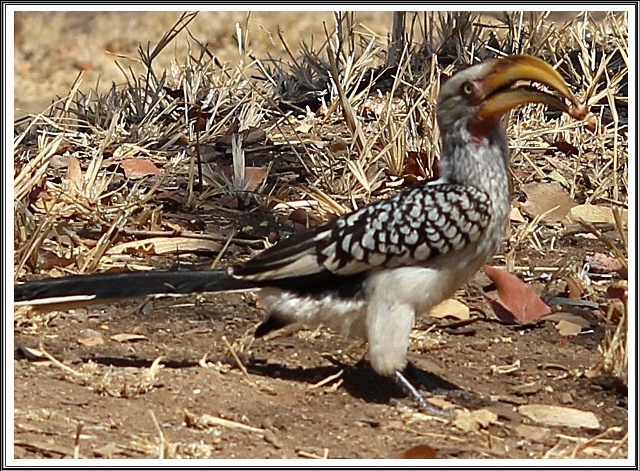
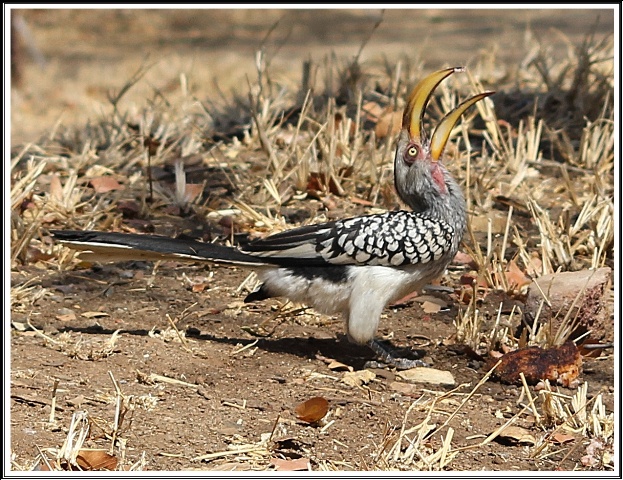
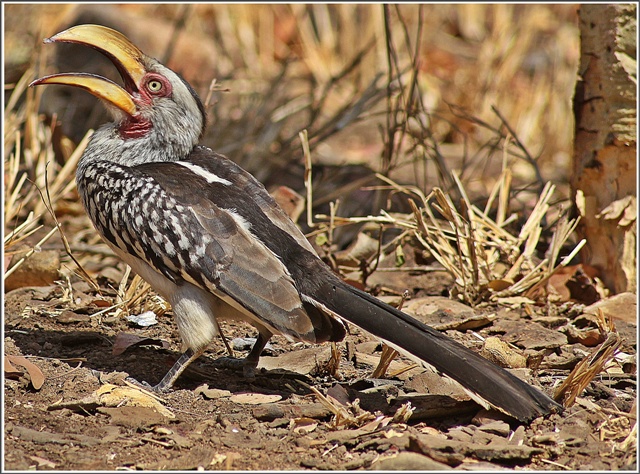
Dewi, I watched the hornbill feed on some left-over 'brandsel' (burnt porridge) that they found in camp.
It did get annoyed with the sticky substance on it's beak...



Pretoriuskop
Satara
Shingwedzi
20-30 Dec 2014
Satara
Shingwedzi
20-30 Dec 2014
Re: HORNBILL - African Wild Bird Of The Month November
Some more Banana-bills....
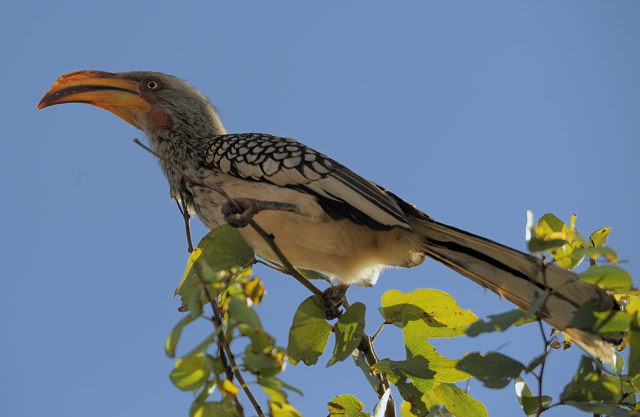
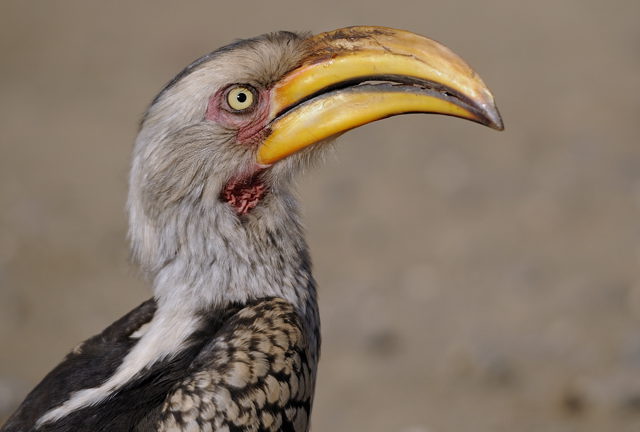
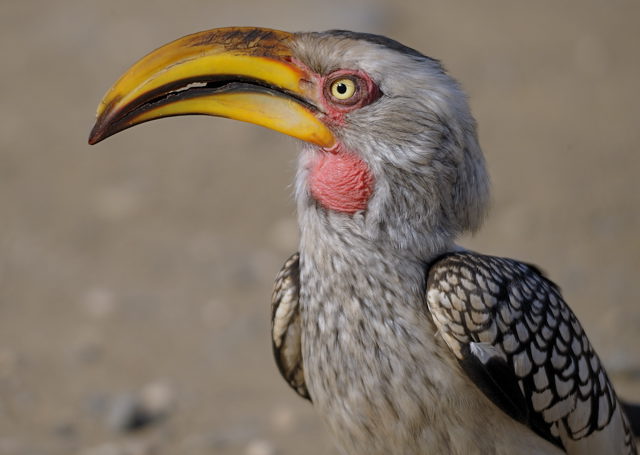
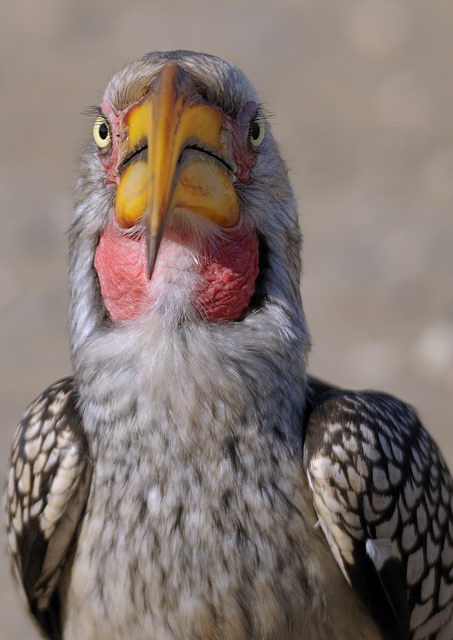




Amoli wrote: Dewi, do the hornbills go 'bald' under their beaks with age ??

Dewi wrote: The throat patches are inflated as part of breeding display. They are larger in males than females.
Dewi
What is the good of having a nice house without a decent planet to put it on? (H D Thoreau)
What is the good of having a nice house without a decent planet to put it on? (H D Thoreau)
- mposthumus
- Posts: 958
- Joined: Thu May 31, 2012 9:51 pm
- Country: South Africa
- Location: Pretora
- Contact:



